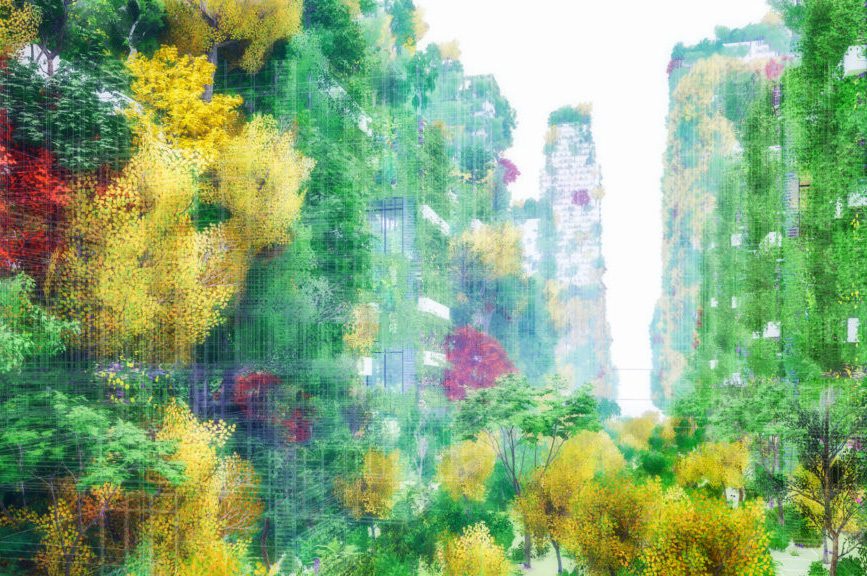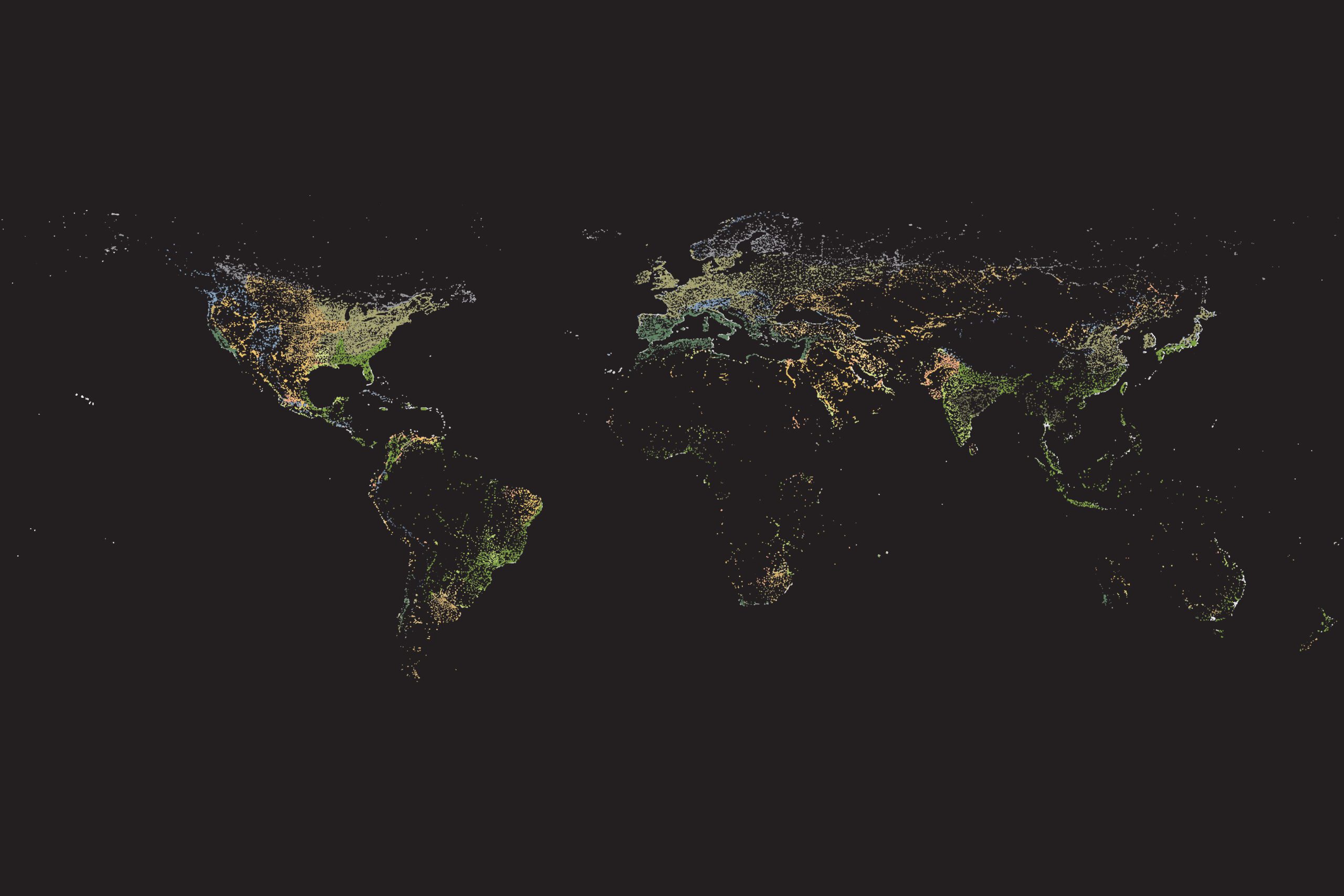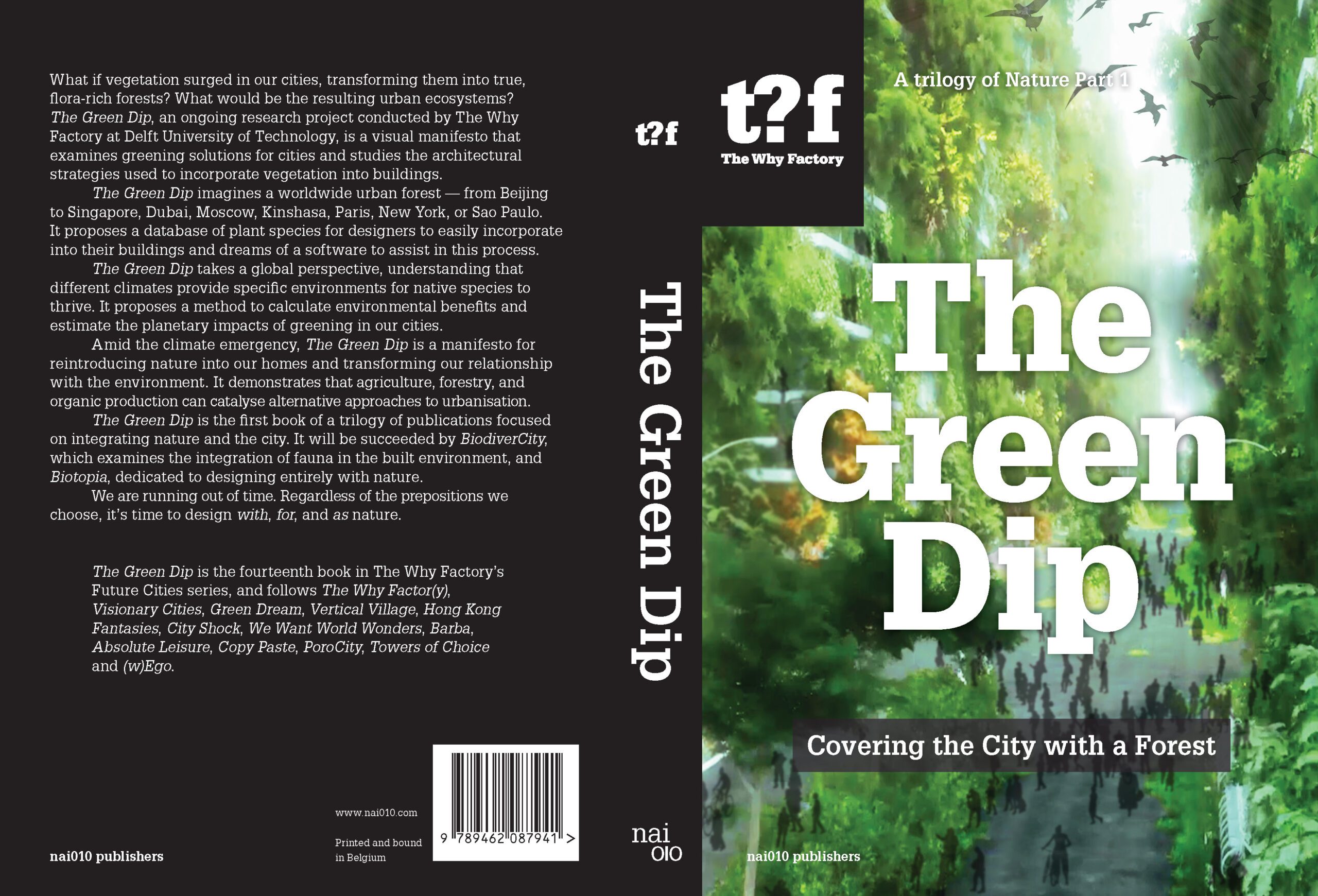What if vegetation proliferated in our cities, transforming them into veritable forests rich in flora? What would the resulting urban ecosystems be? The Green Dip, an ongoing research project led by The Why Factory at Delft University of Technology, is a visual manifesto that speculates on greening solutions for cities and imagines architectural strategies for incorporating vegetation into buildings.
Green Dip envisions a global urban forest—from Beijing to Singapore, Dubai, Moscow, Kinshasa, Paris, New York, and São Paulo. It proposes a database of plant species for designers to easily incorporate into their buildings and envisions software to aid this process.
Green Dip takes a global perspective, understanding that different climates provide specific environments for native species to thrive. It presents a method for calculating environmental benefits and estimating the planetary impacts of greening our cities.
Amid the climate emergency, The Green Dip is a manifesto for reintroducing nature into our homes and transforming our relationship with the environment. It demonstrates that agriculture, forestry, and organic production can catalyze alternative approaches to urbanization.
Green Dip is the first part of a trilogy of publications focused on the integration of nature and the city. It will be followed by BiodiverCity, which examines the integration of wildlife into the built environment, and Biotopia, dedicated to designing entirely with nature.
Like all previous publications by The Why Factory, The Green Dip is based on student work—not scientific work. This book is the result of design speculation for educational purposes.
We're running out of time. Regardless of the prepositions we choose, it's time to design with, for, and like nature.
About the authors
Winy Maas
Winy Maas is the Director of The Why Factory and Founding Partner and Principal Architect of MVRDV. He has received international acclaim for his wide range of urban planning and construction projects, across all typologies and scales. At The Why Factory at TU Delft,
Maas pushes the boundaries of established standards to produce solutions that reimagine how we live, work, and play. In addition to his dedicated leadership role at MVRDV and professorships at TU Delft and elsewhere, Maas is widely published, actively engaged in advancing the design profession, and serves on numerous boards and juries.
“I advocate for denser, greener, more attractive and livable cities, with a design approach that focuses on innovative and sustainable user-defined ideas for the built environment, regardless of typology or scale.” – Maas
Javier Arpa Fernández
Javier Arpa Fernández is a professor, researcher, author, and curator of architecture and urbanism. Having completed a Master of Science in Architecture at Delft University of Technology, Javier specializes in the dissemination of architectural and urbanism practice. Javier was the Research and Education Coordinator for The Why Factory and the Curator of Public Programs at the Faculty of Architecture at TU Delft. Javier gives public lectures and participates in colloquia worldwide. Javier has been a professor at the University of Pennsylvania, a Design Critic at Harvard GSD, an Adjunct Professor at Columbia GSAPP, and a Visiting Professor at ENSA-Belleville and ENSA-Versailles. He was Deputy Editor of Domus Magazine and Senior Editor of the a+t research group. He is a co-author of the a+t series “Density,” “Hybrids,” “Civilities,” “In Common,” and “Strategy,” and the volume “The Public Chance.”
He was curator of the exhibition Paris Habitat, about a century of social housing in Paris, held in 2015 at the Pavillon de l'Arsenal in Paris, and author of the monograph “Paris Habitat: One Hundred Years of City, One Hundred Years of Life”.
Adrien Ravon
Adrien Ravon is an architect and academic. In September 2011, he joined The Why Factory at the Faculty of Architecture and the Built Environment at TU Delft. He has participated in research and education projects, been responsible for the production of digital design tools, and actively collaborated in the public dissemination of ideas about the city of the future. He co-authored publications in The Why Factory's Future Cities Series: Barba, Life in a Fully Adaptable Environment (2015), Copy Paste, the Badass Copy Guide (2017), PoroCity, Opening up Solidity (2018), Le Grand Puzzle, Manifesta 13 Marseille (2020), (w)Ego, Dream Homes in Density (2022).
He has collaborated with numerous international institutions, including ETH (Zurich), KTH (Stockholm), GSAPP (New York), IAAC (Barcelona), Centre Pompidou (Paris), Dutch Design Week (Eindhoven), Manifesta 13 (Marseille) and Mori Art Museum (Tokyo).
Adrien has worked as an architect and consultant for companies in Argentina, France and the Netherlands.
Free
Registration
Registrations must be made here.
Selection will be made in order of registration.
Registration will be open until the start of the activity, on site, as long as there are spaces available.




